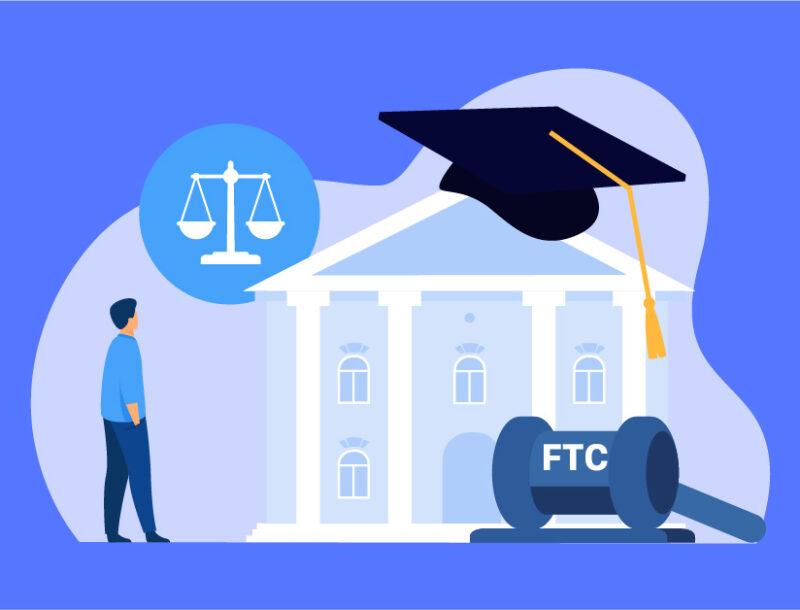Higher Education Compliance: Top Issues, Enforcements, and Penalties

Over the past 5 years, higher education companies have faced over 40 enforcement actions related to consumer protection, resulting in massive fines totaling over $889 million.
As regulatory agencies become more focused on protecting consumers, it’s crucial for higher education companies to continue to ensure that their marketing materials and practices stay transparent, truthful, and compliant with regulations.
Keep reading to learn about the top compliance issues across higher education marketing materials and the most notable enforcement actions taken in recent years.
Key Takeaways
- Common compliance issues for higher education include the use of terms like “best,” “accelerated,” and “lucrative” in marketing materials, which can mislead students if not substantiated with concrete evidence or clear explanations of program limitations.
- Marketing materials can mislead students about tuition costs, potential fees, financial aid, and salary outcomes, leading to violations of consumer protection laws.
- Recent higher education enforcement actions focus on deceptive advertising and “reverse redlining,” false claims about job placement rates, and inaccurate information about income share loans.
Top compliance issues across higher education marketing materials
Best
Using the term “best” in marketing materials (such as “best education,” “best faculty,” “best outcomes,” etc.) is considered subjective and can be potentially misleading unless fully supported by concrete evidence or rankings from recognized entities.
Higher education companies must be careful not to make unsubstantiated claims that could mislead students about the quality of education they offer.
Accelerated
Using the term “accelerated” to describe education programs can be a compliance issue if it makes unrealistic promises of faster completion without sacrificing quality. While some accelerated programs can provide the same amount of education in a shorter time frame, others may not provide the same level of education and qualifications as a traditional education program.
Failure to disclose potential drawbacks or limitations of accelerated programs, such as increased workload or limited elective options, can mislead prospective students and result in consumer harm or complaints if students feel that they did not receive the education they were promised.
Higher education companies have to ensure that their marketing materials provide clear and truthful information about the benefits and limitations of accelerated programs.
Tuition
Mentioning “tuition” in marketing materials can raise compliance concerns due to its financial implications for students.
Higher education companies are required to adhere to consumer protection laws, which include providing accurate and transparent information about tuition costs, potential fees, financial aid options, and refund policies.
Any misleading or ambiguous statements about tuition costs—such as omitting additional fees or misrepresenting financial aid availability—can deceive students and lead to consumer harm.
Higher education institutions must ensure that marketing materials accurately represent the true cost of attendance and provide clear information about available financial assistance and refund policies.
Increase your salary
Promising a specific increase in salary as a result of completing a program can be problematic unless backed by verifiable data or statistics. Even then, it’s impossible to guarantee an increased salary for every student because the outcome is based on various factors that are often out of the institution’s control.
Making unsubstantiated claims about salary outcomes can mislead students and lead to UDAAP compliance violations and consumer harm.
Companies should provide realistic expectations about potential career outcomes and avoid guaranteeing specific salary results.
Lucrative
Describing education or career opportunities as “lucrative” could be considered misleading if it implies guaranteed financial success without proper context or evidence.
While certain fields or industries may offer high earning potential, success depends on various factors such as skills, experience, market demand, and economic conditions.
Notable higher education enforcement actions
Class-action lawsuit for false advertising and “reverse redlining”
This class-action lawsuit was filed against an online university for engaging in “reverse redlining” by intentionally targeting Black and female students for what it falsely represented to be “cost-effective” and “time-effective” online degree programs, but that actually amounts to an expensive predatory scheme.
The university concealed the actual cost of its Doctorate in Business Administration (DBA) program. Despite promoting a doctoral degree with a specific number of required “capstone” credits, the university enticed students to enroll in the DBA program with the false assurance of a rapid graduation.
The university would increase the cost of the DBA program by mandating students to complete extra capstone credits arbitrarily to defer degree completion, which results in tens of thousands of dollars in additional tuition fees for DBA students.
If approved by the court, this settlement will require the university to:
- Pay $28.5 million
- The university has committed to maintaining this change for at least four years by removing certain roles on dissertation committees
- Provide new disclosures on its website regarding the median time to completion and median costs of programs
For-profit school used deceptive ads to lure prospective students into illegal contracts
The Federal Trade Commission (FTC) and the state of New Jersey took action against a company for falsely touting their job-placement rates and that their relationships with prominent companies would lead to jobs after students graduate.
The company used its website, social media, and email campaigns to falsely advertise its partnerships with prominent employers, claiming that these partnerships resulted in jobs for its graduates at those companies. The company also falsely advertised on its website that 90% of students are placed within 3 months of graduation, when in reality, that number was substantially lower, with some programs remaining as low as 52%.
The company then encouraged students to pay for their education using illegal income-share agreements. In total, the school entered into 392 illegal agreements, none of which included certain disclosures mandated by law.
The enforcement action prohibits the company from:
- Falsely advertising any educational product or service
- Denying access to diplomas or transcripts based on any debt forgiven by the proposed order
It also requires the company to:
- Stop collecting debts from students on any income-share agreements it currently holds
- Re-purchase any income share agreements it sold to third parties to stop collection efforts on those agreements
- Request that consumer reporting agencies delete the debt from consumers’ credit reports
- Provide written notification to consumers who are receiving debt forgiveness under the proposed order
For-profit school made false claims about job placement rates and claimed “income share” agreements were not loans
The Consumer Financial Protection Bureau (CFPB) took action against a school for deceiving students about the cost of loans and making false claims about graduates’ hiring rates.
The company claimed that its “income share” agreements were not loans, did not create debt, did not have a finance charge, and were “risk-free.” However, the loans had an average finance charge of $4,000 and carried considerable risk.
They further hid the cost and nature of the “income share” loans by not disclosing key terms like the finance charge and annual percentage rate, as required by law.
The company also falsely advertised on its website that up to 86% of students were placed in jobs within six months of graduation when its non-public reporting to investors consistently showed placement rates closer to 50%.
Under the consent order, the company must:
- Pay $164,000 in penalties
- Cease collecting payments on certain graduates
- Amend “income share” loan contracts
- Allow students to withdraw without penalty


